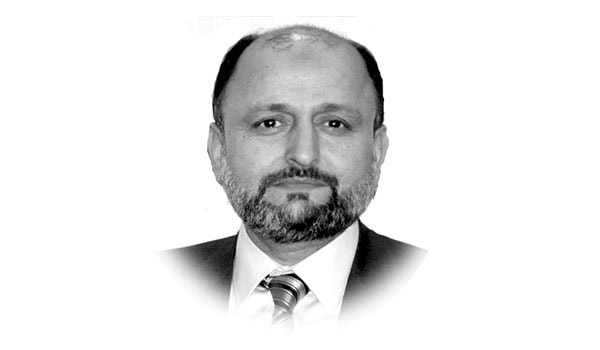National consultation on the economy of Pakistan
I was really excited when I received an invitation to join a ‘National Consultation on the Economy of Pakistan’ on 19 July in one of the leading hotels of Lahore.
Most of the participants arrived in time which suggested everyone’s eagerness in the discussion.
Some leading journalists, academicians, authors, serving and retired government officials and judges, religious scholars, development sector representatives, lawyers, engineers, economists and businessmen participated in the consultation.
There was significant diversity in thoughts and ideas of participants.
Generally religious scholars were of the view to link economic policies with rudimentary practices of early Islamic society with the belief that it is the responsibility of the Creator to feed every living organism on this planet including human beings, which is undoubtedly true but why we forget that “man shall have nothing but he strives for”.
Why we are taught to earnestly pray for “which is good in the world”. Why we are told to “disperse in the land to seek bounty”.
We need to develop a balanced view of life. It is undeniable that majority of Muslim population, at the moment, is suffering due to weak economic conditions of Muslim societies.
Muslim populations are fundamentally dependent on non-Muslim societies for reasonably comfortable life in modern times from transportation to cellular communications, from medicines to food commodities and from furniture to fixtures and fittings.
You name anything for comfort, efficiency and productivity it will have origin in a society other than Muslims, which I think, is unbecoming of followers of a religion which was based on Iqra – reading, understanding, analysis and evaluation.
Attractive part of the session was the participation from different walks of life and from different parts of the globe.
The meeting was held in the backdrop of recent verdict of Federal Shariat Court to ban interest (riba) from all financial institutions of Pakistan.
Therefore, the initial focus of the discussion was on miseries and exploitation of riba which usually culminates its cycle with economic depressions in different societies but in recent times we witnessed global impact of such economic turmoil.
Banking system, tax regimens, trade embargoes, global financial treaties, monopolies all are blamed for the sufferings of masses in modern capitalistic economies.
All claims of trickle-down effect are usually challenged by relevant experts calling for overall transformation of financial and economic system to bring prosperity for the less advantaged.
It has become a real task for economic and financial experts to enact a system ensuring equitable distribution of wealth which human society witnessed for hundreds of years of Islamic super-continental state.
Contemporary financial and economic experts in the session were emphasising the need of expanding tax net to overcome current difficulties of the Country besides other initiatives to expand and strengthen overall economic conditions of Pakistan.
Most of the participants were surprised when a presenter from the UK on a visit to Pakistan, told the audience that they pay 20% VAT (value added tax) and then almost 20% on savings to fulfil their national responsibilities.
It convinced all participants to inculcate the culture of paying tax but almost everyone was not convinced with current practices of FBR and emphasized the need of tax reforms for the convenience of traders and business organizations.
After the speeches of religious scholars a trade representative raised his concern that if interest is considered as a war against the Creator then why there is such a significant prosperity in western countries where interest is not prohibited.
There are several justifications to this observation from the religious community such as they will get their share of happiness in this life but will not get anything in the hereafter.
However, we should remain cautious about such claims because who knows what happens in the life after death.
The kind of observation from the trade representative is based on apparent facts but lacks deep understanding of business dynamics of western communities.
There is a huge segment of leading global business organizations around the world which operates on zero leverage which means without interest based financing for their operations.
Second, venture capital to nurture new entrepreneurs and businesses contributes exceptionally in contemporary business landscape which is identical to Islamic shariah compliant mudarabah financing, in some cases angel investors opt for the agreement which is same as the musharakah.
Many participants advocated adopting fundamental practices of Islam for economics referring it economics of Madina, at the same time several argued to strengthen modern economic indicators for the sustainability of the country.
Land reforms, tax reforms, electoral reforms, reforms in import & export policies, targeted subsidies, human resource development, attracting overseas Pakistanis with special policies and incentives, almost every aspect came under discussion with 26 contributors to the dialogue.
It is important to note that everyone in the hall stressed the need for the political stability in the country.
A representative of The Financial Markets Association of Pakistan (FMAP) gave some interesting suggestions e.g. tagging imports with exports, balancing expenditure and income, per USD rebate for overseas Pakistanis on their remittances which can increase remittances to threefold, he also predicted significant devaluation of rupee in coming months beyond Rs 250 per USD.
Finally the host and the president of Jamat-e-Islami ex-Senator and ex-Minister of Finance KP Siraj-ul-Haq gave his concluding remarks.
He referred to ex-Chairman FBR who said that economy of Pakistan has already defaulted. He stated that in Islam both the market and the mosque are declared as sacred and any fraud and misappropriation is prohibited in these two places.
He said that despite our extensive capability to produce agriculture goods we are subject to shortage.
He shared his personal experience as minister finance KP giving budgets without deficit if there is authentic control on government expenditure.
He invited people from all walks of life to join the mission to ensure economic prosperity of Pakistan without necessarily joining his party.
—The writer is Associate Professor Management Sciences, Head, Centre of Islamic Finance, COMSATS University (CUI) Lahore Campus.










